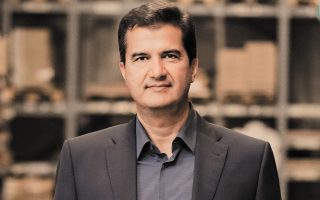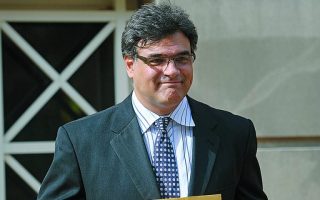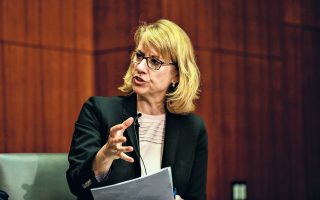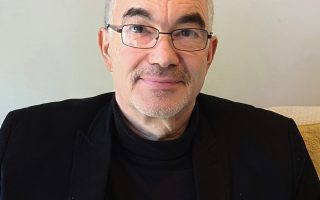Former assistant secretary of state Frank Fannon sees ‘continuity’ in US energy policy
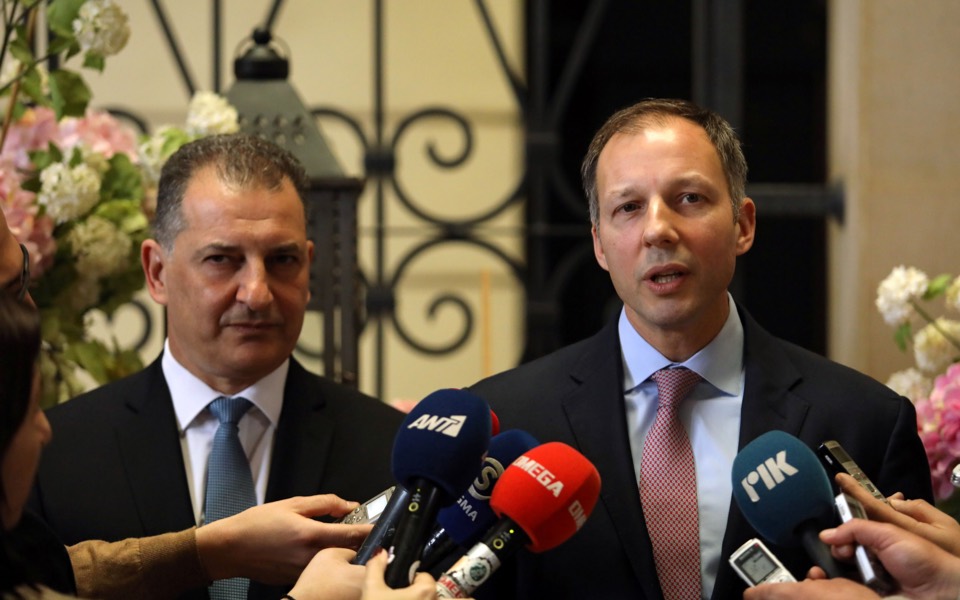
The Biden administration will “maintain a degree of continuity” on US policy for developing a strong energy market in the Southern and Eastern Mediterranean, according to former assistant secretary of state for energy resources Frank Fannon, who was one of the driving forces behind the Greece-Cyprus-Israel trilateral partnership.
In an interview with Kathimerini, the former official, who addressed the online conference Athens Energy Dialogues on Wednesday, conveys American support for the development of natural gas resources in the area, but does not comment on the geopolitical challenges of exploiting new gas deposits or on the EastMed pipeline plan, in which Greece is a key player.
The US has “consistently championed the development of the regional gas market, which could include the potential EastMed pipeline along with other options,” he says pointing to the involvement of American companies, which, he adds, are not controlled by the US government.
Fannon recognizes Greece’s potential as a promising energy hub and the progress that has been made on a series of landmark projects (the IGB, TAP and EastMed pipelines, as well as the floating storage and regasification unit [FSRU] off the coastal city of Alexandroupoli in northern Greece), but warns that this is a challenging task that requires “high-level government commitment, strong diplomatic work and compelling fiscal arrangements to attract capital and technical teams.” He also says that Greece could become a hydrogen hub.
How do you view the priorities of Joe Biden’s administration in the energy sector compared to the previous administration?
The Biden administration seems to have put climate change as the central organizing principle for much of their priorities, including energy. The prior administration elevated security as its organizing principle and energy played a major role as the United States became the largest oil and natural gas producer in the world. We saw that energy could serve as a proxy for other foreign policy issues and encouraged the development of regional energy markets, especially in the Eastern Mediterranean. It is still early days for the Biden administration. We have already seen them make a tonal shift and that is as it should be. Yet, I believe that they will recognize how energy collaboration can create a halo effect in other areas such as fostering political stability and will maintain a degree of continuity.
A meeting was held on January 28 between the energy ministers of seven Southeastern Europe and Eastern Mediterranean countries at which they explored ways of supporting the implementation of the EastMed gas pipeline. The US government has so far been less than enthusiastic about the project, why is that?
The US government has been extremely supportive of the positive energy developments in the East Med. We are pleased to see that US companies have played a major role in discovering the gas fields and have continued to increase their investment in the region even in the face of a global pandemic that shrunk oil and gas investment by 30%. We have consistently championed the development of the regional gas market, which could include the potential EastMed pipeline along with other options. The US government does not control our companies. As such, we promote a free, fair and open market and believe that the market participants are best positioned to get their product to buyers.
You were present and played an important role in the 3+1 ministerial meeting between the energy ministers of Greece, Cyprus, Israel and the USA. What are the objectives of this initiative? How important is it for US foreign policy and what steps must be taken to move forward?
The 3+1 was broader than energy and included the political and security dimensions. I was honored to play a part in leading the energy pillar on behalf of the secretary of state. We sought in the energy pillar to facilitate the development of what was then a very nascent regional market. We created venues for collaboration and convened sub-ministerial level technical work plans across the countries based on their identified needs. For example, the US has led the world in offshore oil and gas production. We brought our technical experts from the Department of the Interior to work with their peers on environmental stewardship and safety. We were undertaking similar programs on renewable energy. The 3+1 was well regarded by all of the countries and I believe that it will endure going forward.
What is your position on the Nord Stream II pipeline, which appears to be close to completion, and over which the US has vowed to impose sanctions on the companies involved in its implementation?
In the US, NS2 faces overwhelming bipartisan opposition. Congress has, through legislation, directed the executive branch to impose sanctions. Pursuant to that direction, we have taken multiple actions and have stopped the project. An almost completed pipeline is still not complete. Given continued strong bipartisan opposition, NS2 could be a true stranded asset.
How do you view the progress of the crucial projects for the diversification of sources which Greece is a part of, like the IGB, EastMed and FSRU Alexandroupoli?
Greece has made enormous progress on these and other projects. In a very short period of time, Greece has taken action to realize the dream so many other countries around the world share – to become an energy hub. This is not easy. It takes high-level government commitment, strong diplomatic work and compelling fiscal arrangements to attract capital and technical teams. I have seen this firsthand and am honored to have worked alongside Greek officials and others from the region to advance this vision.
About a year ago, Chevron, the world’s second largest private oil company, took over Noble Energy’s shares in Israel and Cyprus. How do you think this will affect the choice of new export routes from the Eastern Mediterranean?
Chevron’s investment is significant for a few reasons. First, Covid has created a once-in-a-hundred-years demand destruction event, which in turn reduced global oil and gas investment some 30%. Chevron’s decision and timing to acquire Noble for its East Med position is a sign of confidence in the region’s geologic prospectivity and political stability. Second, Chevron is an integrated oil company with downstream and midstream businesses around the world. I fully expect that they will draw on their global expertise to determine the optimal export routes in terms of reliability, safety, environmental performance and economics.
Taking into account Greece’s comparative advantages – for example sun and sea – do you think that hydrogen could be a serious prospect for the country’s energy autonomy?
Hydrogen holds considerable promise for many use cases and could lead to major positive transformations over time. Cost-effective green (from renewables) or blue (from natural gas with carbon capture and storage) hydrogen production is still under development, especially at scale, and the economics would vary widely based on location. Greece may indeed have the potential to become a hydrogen energy economy. However, I would suggest that if that were the case, then Greece could build on its current foundation and become a hydrogen hub to the region.
